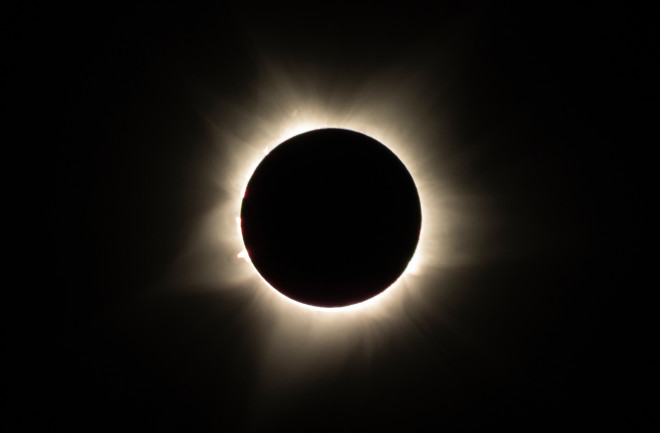Humans have observed and tracked solar eclipses for millennia. In many cases, a solar eclipse brought on fear and foretold the end of the world or was a sign of great misfortune. To explain the causes of a solar eclipse, ancient humans would seek spiritual justifications and tell folkloric tales for why they occur. From these explanations, many myths and superstitions exist. Most of these are only myths and have since been disproven.
Myth 1. Eclipses Are an Omen of Misfortune
Many of the beliefs that an eclipse is a negative event stem from ancient folklore. Some examples include the ancient Greeks, who thought that an eclipse was a sign that the gods were displeased and would bring misfortune upon humans.
One mythological concept the Aztecs had about an eclipse was that the sun disappeared because a jaguar was going to eat it. To release the sun, the ancient people would make as much noise as possible to scare the jaguar into letting it go. Like the Aztecs, the ancient Chinese thought that solar eclipses happened when a dragon attacked and ate the sun. The dragon also must be scared away by noise.
Solar eclipses are likely seen as harbingers of disaster because they were noted at several historically significant events. In 763 B.C.E., ancient Assyrian records tell of an eclipse that happened at the same time as a revolt in the city of Ashur. Another example is the death of King Henry I of England in 1133 A.D., which happened during a solar eclipse.
Read More: These 5 Ancient Cultures Thought Solar Eclipses Were Omens and Prophecies
Myth 2. Eclipses Are Harmful to Pregnancies
Some ancient cultures believed that an eclipse could cause issues during pregnancy or cause the child to be born with a disability like a cleft lip, blindness, or birthmarks. The Aztecs thought that because a monster or jaguar was going to take a bite of the sun, if a pregnant woman looked at the eclipse, it would harm the baby.
Other myths surrounding pregnancies include harmful radiation emitted during the eclipse that might harm a developing fetus. According to NASA, this is not true, and the radiation emitted from the sun towards Earth, called neutrinos, are harmless. Our bodies are hit with trillions of neutrinos by the second. Still, these are not harmful and will not affect those who are pregnant.
Today there are still superstitions that pregnant people follow during a solar eclipse. These include not looking at the solar eclipse, staying indoors, or wearing a safety pin on the belly in Mexican American cultures.
Read More: How Many Ways Can the Sun Kill Us?
Myth 3. A Total Eclipse Can Cause Blindness
It is safe to view a solar eclipse after the disk of the moon completely covers the sun. The light seen around the dark disk, or the sun’s corona, is very faint. It does not cause blindness.
Still, you should not directly look at an eclipse before totality. Special eyeglasses are needed to view the sun before its full totality, even if the sun is partially covered. Watching the Sun before totality may cause permanent damage to your retinas. But NASA states that your eyes will look away before any real damage happens.
Read More: Eclipses Are Beautiful To Watch, But Only If You Have The Right Protective Eyewear
Myth 4. Food Made During the Eclipse is Inedible
This myth stems from the idea that the sun’s rays produce dangerous radiation during an eclipse. Another myth says food consumed during an eclipse will lead to bad health. But this is not true.
If it were, then all types of food, including crops, would be contaminated during the event, too. Per NASA, a total solar eclipse can spark up fear, especially with the hues around the sun during totality.
Read More: Disoriented Animals Behave Strangely During Total Solar Eclipses
The April 8, 2024, Total Solar Eclipse
The next solar eclipse to pass through the U.S. will be in 2045. So be sure to go out within the line of totality, wear your eclipse glasses, and catch a glimpse of the eclipse. If you are planning to travel for the eclipse, do so early!
Read More: 5 Ways to Enjoy the Solar Eclipse Without Totality
Article Sources:
Our writers at Discovermagazine.com use peer-reviewed studies and high-quality sources for our articles, and our editors review them for accuracy and trustworthiness. Review the sources used below for this article:
Exploratorium.edu. Eclipse Stories from Around the World
Encyclopedia Britannica. The Sun Was Eaten: 6 Ways Cultures Have Explained Eclipses
Almanac.com. Solar Eclipse Folklore, Myths, and Superstitions
NASA. Eclipse Misconceptions
Library Congress of Blogs. Solar Eclipse: A Moment of Awe, Wonder, and Belief
NASA. 2024 Total Solar Eclipse

